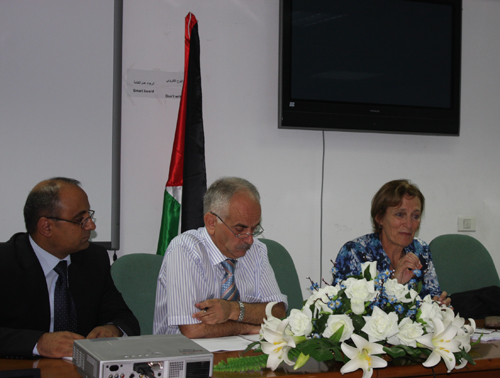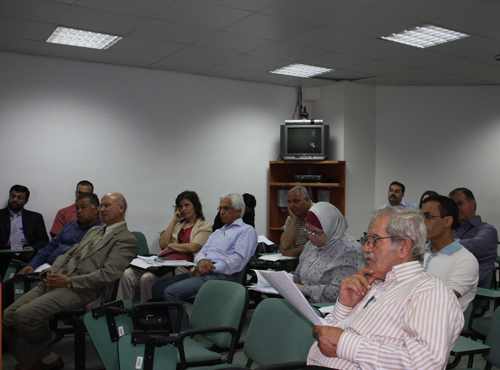The Deanship of Scientific Research at the University Organizes a Workshop for Professor Judith Tucker on Publication
On July 29th 2010, the Deanship of Scientific Research at the University organized a workshop on publication for Professor Judith Tucker from the Department of History at Georgetown University in the United States. Prof. Ghassan Saffarini, Dean of Scientific Research at the University and a number of professors, scholars and researchers from the different faculties and departments attended the meeting.

Tucker is a Professor of History at Georgetown, the Director of the Master of Arts in Arab Studies Program and former editor of the International Journal of Middle East Studies. She is the author of many publications on the history of women and gender in the Arab world, including Women in 19th Century Egypt, (Cambridge University Press, 1985), co-author of Women in the Middle East and North Africa: Restoring Women to History (Indiana University Press, 1999), the editor of Arab Women: Old Boundaries, New Frontiers (Indiana University Press, 1993) and many others.
The workshop focused on the issue of publishing academic articles and the various stages through which this process goes. She explained each stage independently from choosing the topic of the article to the final submission of the work. Professor Tucker first spoke about the idea of academic article and how scholars should go around writing their papers in a way that guarantee the acceptance of the work.

She illustrated that the process of publishing an article goes through several phases including: choosing a journal, deciding where to submit the article, rewriting, interpreting, formatting, citation, transliteration, preparing the paper for submission …etc. She further explained the stages that follow submission including peer review, editing, and proof reading. She also spoke about the idea of Impact Factor which refers to the relative importance of a certain article or journal within its field. Journals which have high impact factor are likely to be considered more valuable or significant than those with low impact factor. The impact factor is usually used more heavily with respect to scientific fields than with humanities or social sciences.
Furthermore, she described the process of writing the manuscript of the article and how a scholar should handle this task. She said that a scholar must pay attention to a number of issues when writing his / her manuscript so as to make sure that the work will get accepted. Before writing a journal a scholar must read widely in the field in which he / she is writing so as to get a closer and more thorough look into how articles are written and structured. She added that the best way to gain experience in this field is by asking those who have published before and know when and how to publish the article.
Professor Tucker said that some articles might contain rich, novel and valuable information but are not properly put together which eventually ends with the article being rejected. Regarding this matter, the Professor offered a number of advices and guidelines on how to manage journal publication which would help scholars publish their work easily and promote their ideas. Other topics included: publication agreement, evidence of copyright material, peer review, types of journals, final submission and approval of the article.



